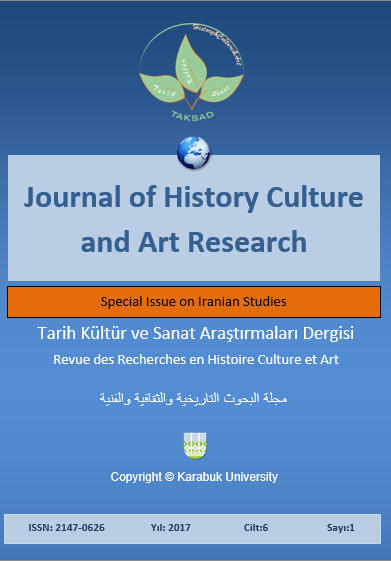The Tragedy in the Story of Rostam and Sohrab in Ferdowsi’s Shahnameh
DOI:
https://doi.org/10.7596/taksad.v6i1.707Keywords:
Ferdowsi, Epic, Tragedy, Rostam and Sohrab.Abstract
Tragedy is a stunning example of confrontation between man and nature along with sadness and consequently fate and life. In tragedy, usually one person (hero) is in the center of the story and all of the stories come together to make the inevitable fate happen for that hero. This inevitable fate is usually along with death or a tragic end which occurs for the hero.
The purpose of poet in tragedy is illustration of an advice for readers after death of the hero. In this article, we have tried to review various aspects of tragic story of Rostam and Sohrab and the way the Master of Tous makes his audience and fans aware of passage of time and the eternal destiny using analytical descriptive method. Undoubtedly, what the ancient Greeks, especially Aristotle have proposed as a definition for tragedy as, is in some cases different from Ferdowsi's view but there is a close consistency between the nature of tragedy and the base of tragedy of Rostam and Sohrab and definition of tragedy.
References
Anvary H. & Shoar, J. (1999). Rostam and Esfandiar Epic, Tehran: Drops.
Anvary, H. (1999). Speaks with Culture, Volume 1, Tehran: Statement.
Aristotle (2009). About the Art of Poetry. Translated by M. Sohail, Tehran: Wisdom Publications.
Aristotle (2009). Art of Poem, Translated by Soheil Muhsin Afnan, Tehran: Hekmat Publications.
Chomsky, Noam (1998). The Psychology of Language of Thought, Translated by Kourosh Safavi, Tehran: Agah Press.
Delacampagne, Christian (2003). A History of Philosophy in the Twentieth Century, Translated by Bagher Parham, Tehran: Agah press.
Gaarder, Jostein (2010). Sophie’s Sufi World: A Novel About the History of Philosophy, Translated by Hassan Kamshad, Tehran: Nilufar Publication.
Gholam Rezaei, M. (2002). The Style of Persian Poetry of Rudaki to Shamloo, Tehran: Heroes.
Hashemi, M. (1970). On the Side of the Medes Iran, Tehran: The Mirror of Knowledge.
Hazrat Hassan (2012). Historian and Historiography, Tehran: Institute of Contemporary History.
Khanlari, Zahra (1962). A Guide to Persian Literature, Tehran: Tehran University Printing.
Magee, Bryan (2007). The Great Philosophers: An Introduction to Western Philosophy, Translated by Ezatollah Folladvand, Tehran: Khwarizmi Press.
Munshi, Abu’l Ma’ali NasrAllah (1994). Panchatantra, the Correction M. Mino, Tehran: Sepehr Publication.
Parsinejad, Iraj (2009). Ehsan Tabari and Literary Criticism, Tehran Talks.
Rhymy, M. (1990). The Tragedy of Power in the Shahnameh of Ferdowsi, Tehran: Lily.
Safa, Zabihullah (1994). History of Literature in Iran, Summary of Mohammad Torabi, Volume I, Tehran: Phoenix.
Secretary, N. (1994). Panchatantra, Correct Spiritual Mojtaba, Tehran: Sepehr.
Shmysa, S. (1994). General Stylistics, Tehran: Ferdows.
Tafazoli, A. (1997). Literary History of pre-Islamic Iran, Tehran: Statement.
Tanner, Michael (2008). Schopenhauer: Metaphysics and Art, Translated by Akbar Masoom Beigi, Tehran: Agah Press.
Zarrinkoub, Abdul (1992). Poet without Lies Unveiled Poetry, Tehran: Scientific Publications.
Zarrinkoub, Abdul (1995). Literary Criticism, Tehran: Amir Kabir.
Downloads
Published
How to Cite
Issue
Section
License
All papers licensed under Creative Commons 4.0 CC-BY.- Share — copy and redistribute the material in any medium or format
- Adapt — remix, transform, and build upon the material for any purpose, even commercially.
Under the following terms:
Attribution — You must give appropriate credit, provide a link to the license, and indicate if changes were made. You may do so in any reasonable manner, but not in any way that suggests the licensor endorses you or your use.
- No additional restrictions — You may not apply legal terms or technological measures that legally restrict others from doing anything the license permits.







